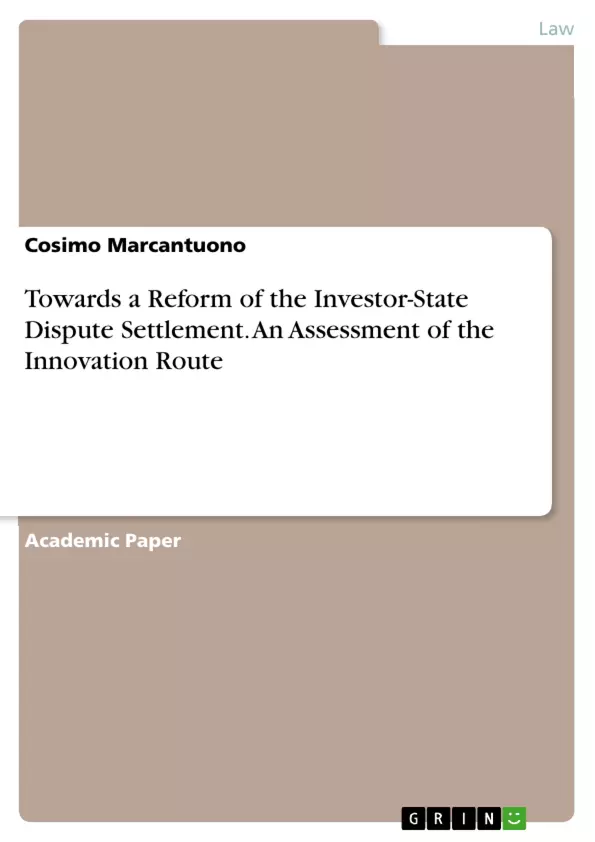After a long journey, the Court of Justice of the European Union (CJEU) finally opened to an external system of judicial review. Indeed, despite the CJEU's historically notorious lack of openness towards an Investment Court System (ICS), a positive attitude was expressed in the opinion (C-1/17). This new attitude assumes a high degree of relevance in the discussions for a reform of the current Investor-State Dispute Settlement mechanism (ISDS), whose recursive criticalities will be by this paper investigated. In relation to the latter, the effectiveness of the proposed reforms will be analysed to contribute to the discernment as to which of the reform alternatives would be most effective.
The analysis that will be carried out will begin by illuminating points of conflict with the interests involved in the current system. Consequently, the reforms proposed and currently being negotiated to resolve these issues will be analysed in order to (i) verify the manner in which they propose to offer a solution to the aforementioned criticalities; and (ii) assess which of the reform alternatives is best suited in terms of effectiveness and associated risks both in terms of coordination with the existing system and scope innovativeness.
In framing the reform framework under negotiation, the analysis will devote particular attention to the debate on the most suitable of the alternatives between (i) the creation of a stand-alone court of appeal and (ii) the creation of a two-tier 'multilateral investment court' (MIC).
Inhaltsverzeichnis (Table of Contents)
- I. Introduction
- II. The rationale underpinning the reform
- A. Consistency and predictability of arbitral decisions
- B. Treaty interpretation
- C. Impartiality and independence of arbitrators
Zielsetzung und Themenschwerpunkte (Objectives and Key Themes)
This paper explores the ongoing debate surrounding the reform of the Investor-State Dispute Settlement (ISDS) mechanism. The author aims to analyze the effectiveness of proposed reforms and discern which alternatives offer the most efficient solutions to the system’s criticalities. The analysis focuses on the potential conflict between various interests within the current ISDS framework, examining the reforms proposed to address these issues. The paper will delve into the effectiveness and risks associated with different reform alternatives, particularly comparing the establishment of a stand-alone court of appeal and the creation of a two-tier multilateral investment court (MIC).
- The need for ISDS reform
- The key challenges of the current ISDS system
- The proposed reforms to address the system's shortcomings
- The comparative analysis of different reform alternatives
- The potential impacts and risks associated with each reform approach
Zusammenfassung der Kapitel (Chapter Summaries)
The introductory chapter sets the stage by highlighting the European Union’s (EU) evolving stance towards an external system of judicial review, specifically focusing on the CJEU’s positive attitude towards an Investment Court System (ICS). The chapter also outlines the paper’s objective: to analyze the effectiveness of proposed reforms to the ISDS system and assess which alternatives would be most suitable in terms of effectiveness and associated risks.
Chapter II delves into the rationale behind the need for ISDS reform. It provides a comprehensive overview of ISDS, highlighting its essential features and its increasing international relevance. The chapter elaborates on the history of reform discussions, beginning in 2004, and discusses the International Trade Law Working Group III's broad mandate to discuss potential changes to the current ISDS system.
The remaining chapters examine the main challenges facing the ISDS system, exploring key issues such as the lack of consistency and predictability of arbitral decisions, the need for more effective treaty interpretation, and concerns regarding the impartiality and independence of arbitrators. The chapter discusses various proposed reforms to address these challenges, including the potential for parties to issue binding interpretative declarations and the importance of safeguarding the impartiality of arbitrators.
Schlüsselwörter (Keywords)
The central keywords and focus topics of this text are: Investor-State Dispute Settlement (ISDS), Investment Court System (ICS), reform of ISDS, multilateral investment court (MIC), arbitral decisions, treaty interpretation, impartiality of arbitrators, consistency and predictability, effectiveness, risk assessment, EU legal order, investment treaties, international trade law.
- Quote paper
- Cosimo Marcantuono (Author), 2022, Towards a Reform of the Investor-State Dispute Settlement. An Assessment of the Innovation Route, Munich, GRIN Verlag, https://www.hausarbeiten.de/document/1321671


